There can only be two years in contest for the golden year of athletics – the track and field in Nigeria.
In 1996, Nigeria soared highest to Olympic glory, winning four medals including a first ever individual Olympic gold medal!
In fact 1996 was laced with lots of firsts in Nigerian athletics. It was the year Falilat Ogunkoya made history as the first Nigerian track and field athlete to win an individual medal at the quadrennial games.
It was also the first time Nigeria would win a first ever medal in the spring courtesy of Mary Onyali’s bronze win in the 200m.
The year also witnessed another first: a double medal win by an athlete in the history of Nigeria’s participation in the Games via Falilat Ogunkoya’s 400m bronze medal and 4x400m silver medal wins.
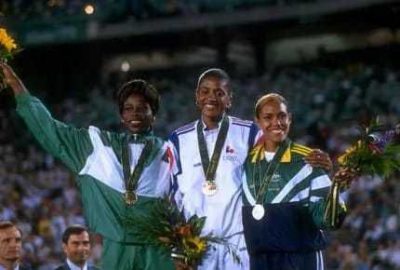
It was also the year three African records were set by Nigerian athletes at the same Olympics viz Ogunkoya’s 49.10 seconds 400m run to win a bronze medal; the 3.21.04 4x400m record set by the quartet of Ogunkoya, Charity Opara, Fatimah Yususf and Bisi Afolabi and of course Ajunwa’s massive and gold-winning 7.12m leap in the long jump.
Outside the Olympics, Francis Obikwelu became the first and so far only Nigerian to successfully complete a sprint double at the IAAF (now World Athletics) World Junior Championships in Sydney, Australia.
Also Read: Top 10 Fastest Men In Nigeria’s Sprint History
If 1996 was the year for Olympic glory,1998 was as indelible. It was the year Nigerian athletes made headlines in world track and field circuit and beyond.
It was the year two young athletes, Seun Ogunkoya and Glory Alozie stormed the international scene like a bolt out of the blues and wowed the whole world.
Seun, a 10.15 seconds runner just two years before began 1998 brandishing the 9.97 seconds he ran in September of the previous year as his only claim to stardom. He however proved he was made for the big occasion when he served notice that a world class sprinter has emerged after running 9.96 seconds in Zurich to defeat the great Frankie Fredericks who two years earlier was beaten to Olympic sprint titles by two world records (Donovan Bailey,19.84 seconds in the 100m and Michael Johnson’s 19.32 seconds run in the 200m).
Seun ‘crushed’, as it were Fredericks again at the African Championships in Dakar, Senegal a few weeks later before running 9.92 seconds to place second at the World Cup in Athletics (now Continental Cup) in Johannesburg later in September. He was ranked number seven in the world that year by influential Track and Field News. Like Seun, Alozie, a 13.30 seconds runner in the 100m hurdles in 1996 began 1998 with just one run inside 13 seconds, her 12.96 performance in 1997.
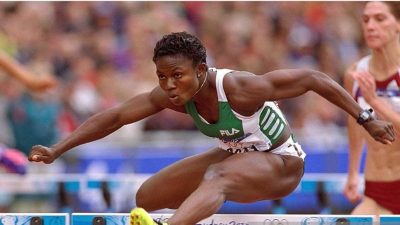
She started 1998 with a 12.85 seconds personal best, improved to 12.66,12.46 and 12.44 seconds twice to set a new African record and a place in the top 12 all-time list at the time. She was also a World Cup winner as she emerged the best (12.58 seconds) in the 100m hurdles in Johannesburg.
She won 15 of 17 races that year and was named the best sprint hurdler in the world in 1998 by Track and Field News.
If Seun and Alozie shocked the watching world from being relative unknowns, the duo of (Falilat) Ogunkoya and Opara dominated the world 400m scene.
It was the first and so far only time Nigerian athletes would dominate an event and would be ranked 1 and 2.While Ogunkoya was ranked overall best after winning the Grand Prix final in Moscow that year, Opara was the world leader with her 49.29 seconds performance at the Golden Gala in Rome, Italy.
Ogunkoya would go a notch higher by winning all available world titles on offer that year. She won the 400m title at the Athletics World Cup in South Africa a few weeks after successfully completing a 200m/400m double at the African Championships in Dakar.
She was also second in the 200m, running an impressive 22.25 seconds behind the great Marion Jones. Her time was a confirmation of the 22.22 seconds she ran to win the half lap gold in Dakar a few weeks earlier. She also won the 400m title at the now rested Goodwill Games in USA before winning the Grand Prix title in Moscow.
In fact the 400m event that year was reduced to a contest for supremacy between the two Nigerians after Opara took a 5-0 lead in the head to head confrontations between the two.
Ogunkoya clawed back to tie the contest 5-5 with her victory in Rome before coming to South Africa later that September to crown her incredible year with two medals at the World Cup.
She was also ranked the third overall best woman that year.
So, which one would be the golden year for Nigerian athletics?
Veteran journalist, Uzor Odigbo believes 1998 was Nigeria’s golden year.
“It should be 1998 when all Nigerian female elite athletes dominated their events in the circuit.(Fali) Ogunkoya, Opara and Alozie were on fire and ranked first in their events with Nigeria dominating the 400m scene. These feats have not been matched till today,” said Odigbo who has covered track and field for over 25 years.
Former African queen of the track, Mary Onyali believes no year can be compared to 1996, the year she won an individual medal at the Olympics and the year the great Ajunwa leapt into immortality at the long jump pit.
Quartermiler Fatimah Yusuf, the first Nigerian woman to run a sub 51 seconds in the 400m (as a junior) believes 1996 and 1998 were truly golden.
“In 1996, we had two athletes in the final of the women’s 400m and we won a bronze medal. We also won a deserved silver in the 4x400m relay,” Yusuf said.
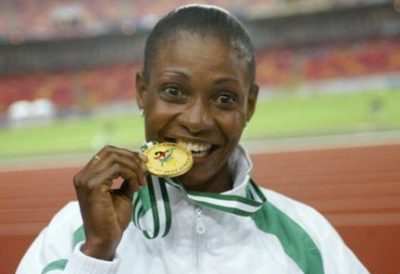
Osheku:1996,1998, my best years as a coach
Foremost athletics coach, Chief Tony Osheku was an active participant in the two years under consideration and he told Complete Sports of is dilemma.
”Actually, both years (96&98) were my best years in coaching. In 1996 I was a rookie in coaching and I had the opportunity to attend few grand prixs. Going to the Olympics for the first time and coming back with two medals was massive.
“Fali (Ogunkoya) was ranked number three in the world in 400m behind (Marie-Jose Perec) and Cathy (Freeman). Some people thought her performance was a fluke so we were determined to work harder to prove them wrong. Our best Olympics as a country was in 1996 not forgetting that (Mary) Onyali also won a bronze in the 200m while Chioma (Ajunwa) won our first Olympic gold medal.
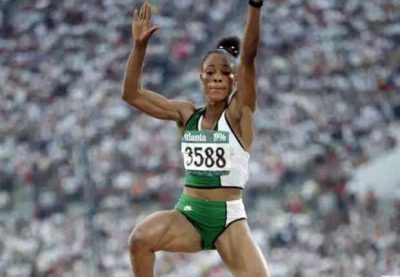
“Then in 1998, World Athletics introduced the Golden League series which has now been christened Diamond League. I traveled to all the Golden League meetings and I was so impressed with more Nigerian athletes competing in the circuit.
“The whole world witnessed the break through of both Glory Alozie who was ranked number one that year in high hurdles and Seun Ogunkoya who was under my tutelage surprised the best sprinters in the circuit when he won in Zurich, one of the most prestigious legs of the Golden League.
”That very year, Charity Opara won the first three Golden League meetings in Oslo, Rome and Monaco and she ran a PB (personal best) of 49.29 seconds that very year.
“At the end of the year, Track and Field News ranked the two Nigerians 1-2, with Fali getting the No 1 ranking and Opara No 2 after meeting 10 times in the circuit and settling for a 5-5 draw!
“I was especially happy to be a Nigerian that year because in most of the Golden Leagues you could see 8-10 Nigerian athletes participating in one meeting.
“In one meet, I had dinner with the following athletes: Fali, Opara, Alozie, Seun, Davidson, Osmond, Asonze, Ajunwa, Onyali, Atede, Deji and Bisi.Obikwelu was not in that meet.
“1998 was also the year unknown Nduka (Awazie) won the World Junior 400m title with 45.54 PB and he got to the championship the very day of his heat.
“Clement Chukwu was also a surprise winner in Dakar (African Championships) 44.65. Honestly 1998 was the year we had many top athletes in the circuit.
“I remember in Lausanne GP, when all the athletes arrived at the Airport,a bus was at the Airport to convey all the athletes to the hotel and to my Surprise, they sent a special car to pick Fali and me to the hotel as a special guest and other athletes were starring at us and I felt on top of the world. Fali didn’t disappoint because she won the meet while her compatriot Opara was second.
“I really believe that with the right structure we can still emulate what we achieved in 1996 and 1998.”
By Dare Esan


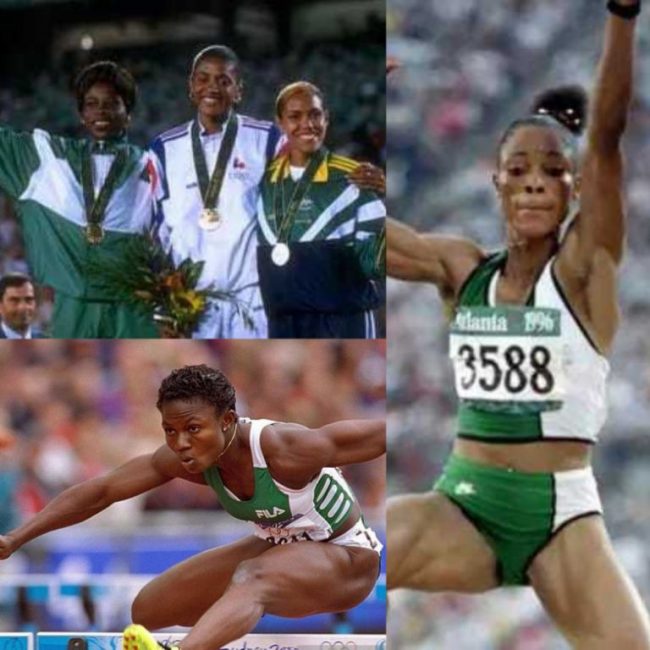


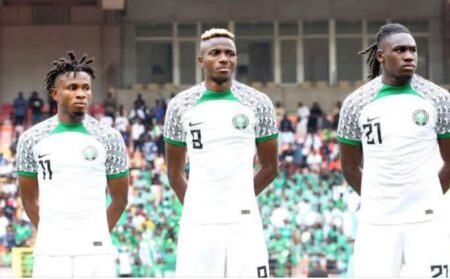
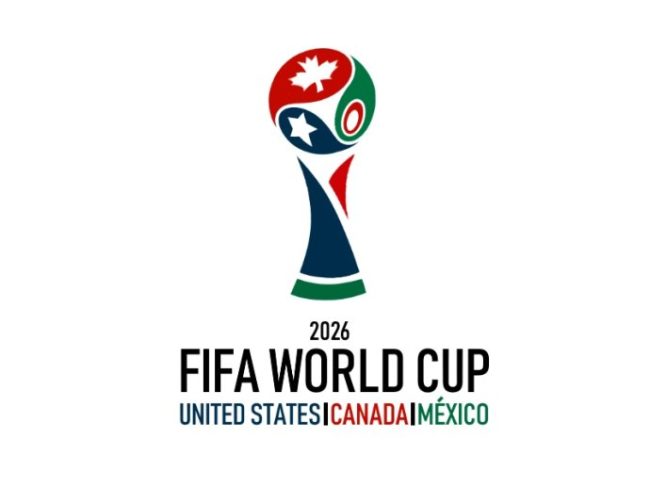

1 Comment
Excellent review. Thank you for bringing to light once again the exploits of our athletes in 1996 and 1998. I can still recall the grainy images on TV of Fali and Opara battling to outdo themselves on track in 1998.
It was a good year to be a Nigerian.